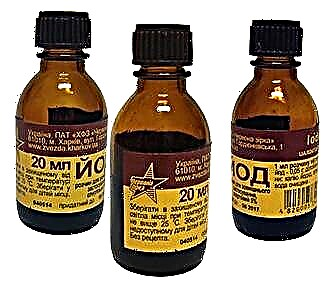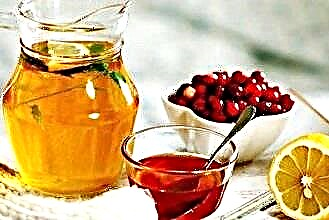Sage has anti-inflammatory, bactericidal and expectorant properties. Thanks to them, this medicinal plant is good for coughing. Very effective folk remedies are a decoction of sage with milk, an infusion of this plant, as well as inhalation.
Our grandmothers used sage as an indispensable remedy for inhalation procedures. After each such procedure, it was necessary to drink a glass of hot milk. Indeed, after intense inhalation of sage fumes, the annoying cough receded. Consider how sage fights cough, and here are some effective recipes.
Healing properties
 Only sage leaves are used to treat coughs. They contain many substances with biological activity:
Only sage leaves are used to treat coughs. They contain many substances with biological activity:
- Tannins - knit, anesthetize, destroy harmful bacteria, constrict blood vessels, and also reduce the rate of mucus production.
- Phytoncides are special volatile substances that eliminate and suppress the development of an infectious agent, in particular, mycobacterium tuberculosis.
- Essential oil is a complex cocktail of fragrant volatile substances with anti-inflammatory and antiseptic properties. These substances also speed up the process of coughing up phlegm.
- Plant gums and cineole are enhancers of the antiseptic effect provided by the aforementioned essential oil.
- Salvin and urosolic acid inhibit inflammation.
- Thujon is a substance with hallucinogenic properties and a number of side effects. Due to its presence in sage, traditional medicine recommends the use of this medicinal plant exclusively externally. Traditional medicine recipes allow it to be taken internally, in particular, together with milk. However, the dosage must be strictly observed. To avoid unwanted and even dangerous side effects.
Recipes
 Since ancient times, drugs made from sage with one’s own hand have saved coughs. They are very simple to do. Here is some of them.
Since ancient times, drugs made from sage with one’s own hand have saved coughs. They are very simple to do. Here is some of them.
Infusion of sage with milk
You will need the following ingredients:
- dry sage leaves (available at the pharmacy) –1 full tablespoon;
- drinking water - 1 standard glass (200 ml);
- milk - 1 standard glass (200 ml);
- honey (in the presence of allergies, it is permissible to replace with sugar).
For brewing sage, use only porcelain or enamel cookware. It is necessary to pour the sage leaves with boiled water and leave for about half an hour. Then you need to thoroughly strain the infusion and add boiled milk to it. To improve the taste and increase the benefits of the drink, it is advisable to add a little honey. If for some reason you cannot consume honey, add some sugar. Drink the infusion warm a little during the day.
If you are making a sage infusion for a child, you can add a lump of butter to it. Children need to drink it before going to bed.
Ancient indian recipe
 You will need the following products:
You will need the following products:
- milk - 1 standard glass (200 ml);
- honey - a full teaspoon;
- cinnamon - half a teaspoon;
- turmeric - a quarter of a teaspoon;
- sage - a quarter of a teaspoon.
The milk should be warmed up, but not brought to a boil. Sage, honey, cinnamon and turmeric should be added to it. Then all ingredients are thoroughly mixed. Wait for the drink to cool slightly, and drink one glass of this potion three times a day. The course of treatment should be no more than 2 days. You cannot drink this remedy on an empty stomach - spices can adversely affect it.
For inhalation
Pour boiling water over the sage leaves and breathe intensively over the vapors of the brewed sage for several minutes, covering yourself with a sheet. Then put on warm cotton pajamas, drink a glass of warm pre-boiled milk, and go to bed.
When you can't take
 Each medicinal plant has its own contraindications. And sage is no exception. Before proceeding with the use of funds based on it, it is recommended to consult a doctor. So, decoctions, infusions and other drugs from sage are prohibited when:
Each medicinal plant has its own contraindications. And sage is no exception. Before proceeding with the use of funds based on it, it is recommended to consult a doctor. So, decoctions, infusions and other drugs from sage are prohibited when:
- pregnancy - provokes uterine contractions and the emergence of a threat of miscarriage;
- breastfeeding - reduces lactation (although it is good to take it during weaning);
- rehabilitation after surgery to remove malignant neoplasms in the uterus and mammary glands;
- hypertension;
- problems with the functioning of the thyroid gland;
- diseases of the genitourinary system.
The course of treatment with a decoction or infusion of sage leaves should be no more than 7 days. If the cough persists, it is necessary to visit the clinic and undergo additional examination.
And finally
 Some traditional medicine experts believe that milk reduces the benefits of sage. Therefore, it is advised not to combine these ingredients. And yet, according to the experience of those who have already used the "grandmother's" recipes, a decoction and infusion of this medicinal plant with milk relieves cough quite well.
Some traditional medicine experts believe that milk reduces the benefits of sage. Therefore, it is advised not to combine these ingredients. And yet, according to the experience of those who have already used the "grandmother's" recipes, a decoction and infusion of this medicinal plant with milk relieves cough quite well.
Can my child take sage with added milk? The answer to such a question can only be given by a pediatrician, having carefully considered all the possible risks. Many safe antitussives are produced today, in particular plant-based ones. Therefore, it is still better to refuse such a drug at an early age.



